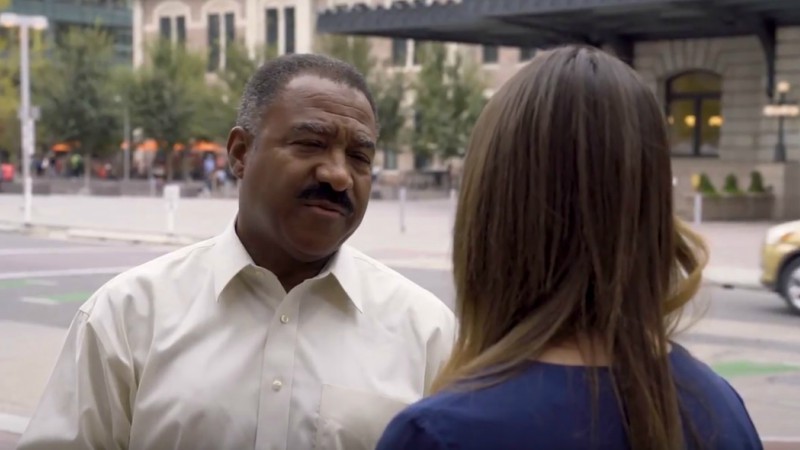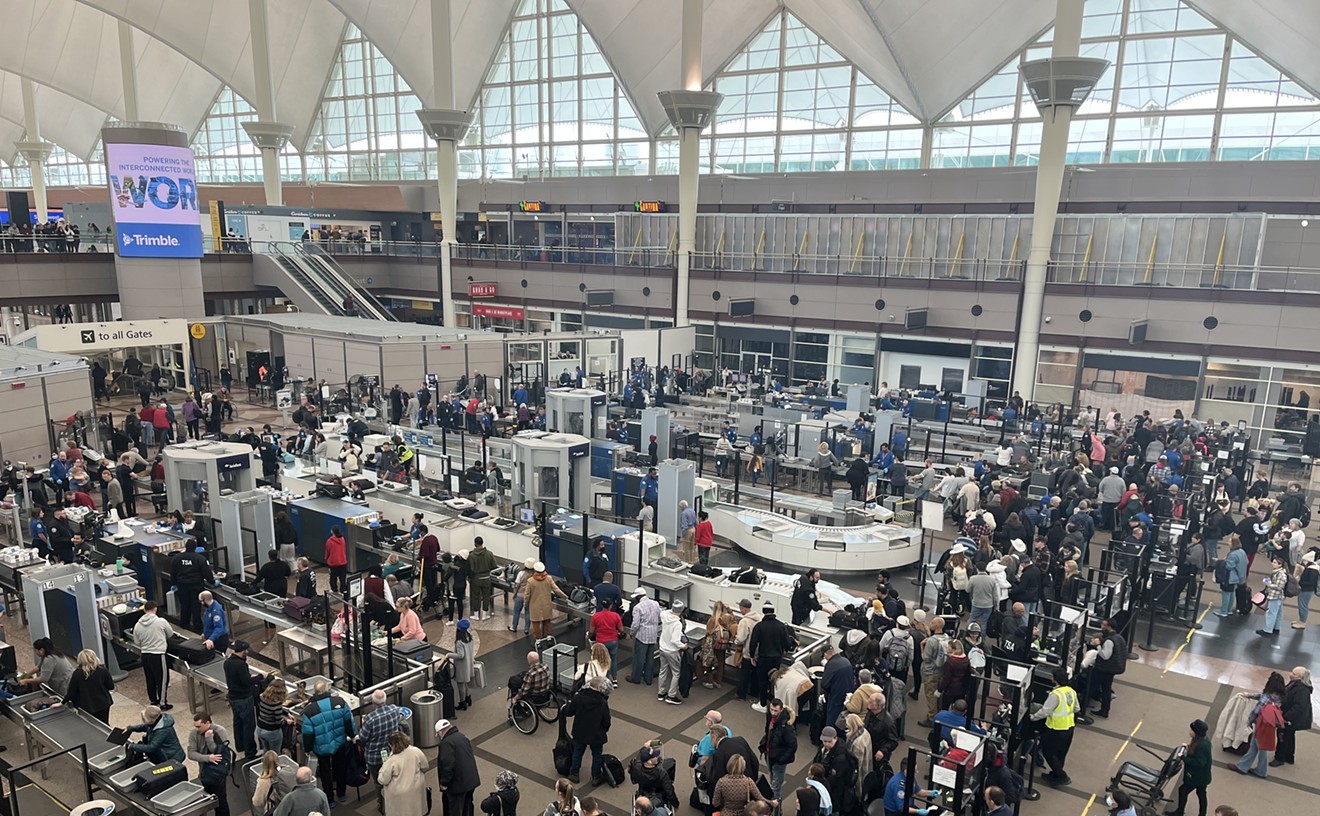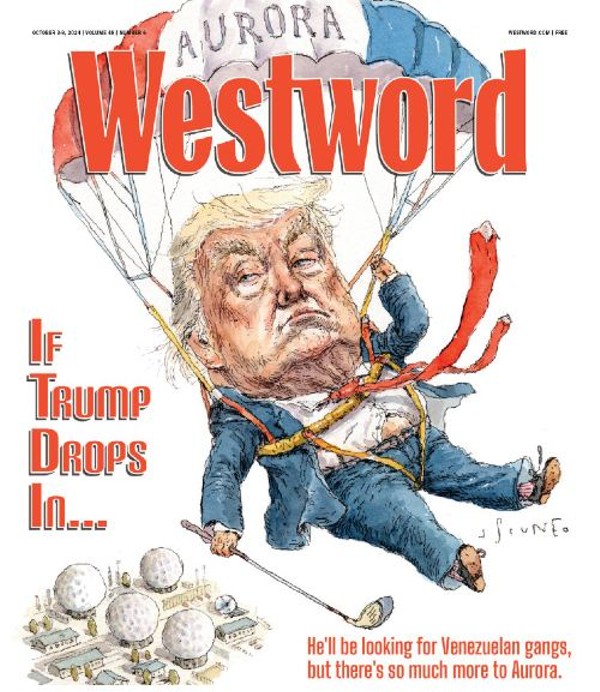Former state senator and city official Penfield Tate has announced his candidacy for Denver mayor in 2019, and he's not tiptoeing around his disagreements with Michael Hancock, the man who currently holds the position.
Take, for example, his response to a question about alleged sexual harassment and the appearance of impropriety by Hancock toward Leslie Branch Wise, a former member of his security team back in 2011 and 2012.
"First, let's deal with definitions," Tate says. "You talked about 'alleged' and 'appeared.' But these aren't allegations. He did them. He admitted to them. And as a lawyer, I would tell you they were proven beyond a reasonable doubt. Of course it's sexual harassment."
As pointed out in his profile on History Makers, a website that describes itself as "the nation's largest African American video oral history collection, "Tate, 62, is the son of Penfield Tate II, the first black city council member and mayor of Boulder. After earning a sociology degree from Colorado State University and matriculating from Antioch School of Law in Washington, D.C., the younger Tate moved to the Denver area as a trade regulation attorney with the local office of the Federal Trade Commission before entering into private practice.
In 1990, Tate accepted an administrative job working for then-Denver Mayor Federico Peña and subsequently served as executive director of the Colorado Department of Personnel and Administration and vice chairman of the Colorado Democratic Party before earning election in 1996 as a state representative and 2000 as a state senator. But after falling short in a previous bid for Denver mayor — he lost to John Hickenlooper circa 2003 — he went back into the private sector. He's currently a member of the law firm Kutak Rock.
What persuaded Tate to get back into electoral politics?
"It was a growing concern for the direction of the community," he replies. "I started to meet with folks around the city, talking with people. Some folks I knew, some I'd never met before. But I shared my perspective and asked them theirs, and what I found was a strong sense of discontent and people not happy with the direction of the city."
He adds: "Because I've always been involved in the life of the city and trying to make it better, a number of folks I spoke with encouraged me to make a run, and after talking to people and conferring with the family, I decided it was time to run again."
Thanks to entrepreneur Kayvan Khalatbari's announcement that he's dropping out of the race, Tate is now the biggest name among challengers to Hancock; other candidates include Wheelchair Sports Camp's Kalyn Heffernan, Marcus Giavanni and Stephan Evans, aka Chairman Seku. And while Hancock has not officially declared his intention to seek a third term as mayor, the fundraiser former senator Ken Salazar threw for him in May strongly suggests it's simply a matter of time.
As for what Tate sees as the biggest issues in the campaign, he cites "my concern with unplanned, unmanaged growth. Denver is going to grow, and that's a good thing. But you've got to plan for it and manage it, and the overwhelming sense is that's not happening in this administration. One person I talked to referred to it as 'gentrification without a plan.' And people throughout the city in different neighborhoods are upset with redevelopment that's occurred to them, not for them or with them. They feel it's a disruptive influence that's driving out small businesses that have been here for a long time and wiping out affordable housing. We don't have enough of that in Denver, if any. It's also exacerbating the homeless crisis and has wreaked havoc with our transportation system."
To address these matters, he continues, "the first thing I do will be to get with folks in the community. I believe the most important responsibility of the mayor of Denver is to make sure every decision you make is in the best interest of the people living in the City and County of Denver, and one of the ways to gauge that is to go to them and get feedback and input from them. We need to have a city plan to manage growth neighborhood by neighborhood, and I would aggressively embark on that effort. I feel the city hasn't done that over the prior eight years. Then, once we get a sense of where we are as a city and what opportunities are available and how we ought to manage growth, I'll talk with developers and neighborhood organizations so that we can manage the growth we know is going to come in a way that meets the needs of the people."
When asked about ongoing traffic nightmares in Denver, Tate cites what he sees as a significant contributor to gridlock: bicycle lanes.
"I promote cycling and bike lanes," he stresses. "But the execution of creating more bike lanes in Denver has been a disaster. They're not consistent throughout the city, they're confusing, and I think the way they've been deployed has been a major mistake. We've made traffic congestion worse by taking lanes out of service for cars with the assumption that they're going to be filled with bicycles, and they're not. They're not heavily used by cyclists, and now we've got scooters in those lanes — and someone is going to be hurt because we're not regulating that process."
Another criticism Tate lobs at Hancock and company is what he sees as a failure to "invest significantly in job training. You're trying to grow, trying to promote jobs, but what you don't have is a work force capable of doing those jobs. Right now, Safeway is advertising for drivers and people to work in distribution centers, because they don't have enough people. And I've talked to other employers who've had to import workers from other states because there aren't enough qualified, trained workers for their businesses. One told me he had to bring people in from Indiana and is putting them up in a hotel to meet his needs. And a lot of those imported workers are actually living in hotels outside of Denver, because they can't afford housing in the city."
He recalls that "the city used to invest pretty heavily in job-training efforts. There was actually a mayor's office of employment and training; I used to serve on one of those councils during the Peña administration. Part of our emphasis was not just job training for the city itself, but also the city working with nonprofit job-training providers who helped train people for different types of employment. You see a very, very small effort in that regard with the I-70 East effort, where the Colorado Department of Transportation opened a system to theoretically train people from the Globeville and Elyria Swansea neighborhoods to do construction work on the project. But over time, the city has defunded job-training programs, and that's a mistake."
In Tate's view, "policing is also an issue. We've had a rash of lawsuits under this administration for over-policing and police brutality and how people are treated in the county jail. And at the same time, we've had a spike in crime and a spike in gang violence, because we don't have the right relationship between the police department and the communities. That's one reason why I think civilian review and oversight is important. I'm in favor of clarifying and supporting the role of the Independent Monitor. But it's also important to work with the uniformed officers to make sure they feel supported, and to work with the chief and the manager of safety to make sure the officers feel connected to the community, and the community feels connected to them. I have three uncles who were police officers, and they knew that their best protection and source of comfort was being part of a community that knew they had their best interests at heart. Police are sworn to serve and protect, and as in any occupation, you have folks who may not live up to that standard. But you can't let the exception drive what you do. That's why we need to go back to the citizens, to the people of Denver, and engage them, so that they understand they have a stake in a successful, responsive police force that's part of a successful, responsive city government."
Meanwhile, the people with whom Tate has spoken "tell me they want an open, transparent, responsive, effective, competent government operating at the highest ethical standards. That's something I heard a lot as I visited around the city. People are concerned that they're not getting the full story or the straight story."
The way Hancock has handled the Branch-Wise controversy is a case in point, Tate maintains. "People are disappointed by his behavior. Even after his admissions, he tried to say what he'd done wasn't sexual harassment, just unduly familiar conduct. Well, I don't know about you, but if someone sent my wife or daughter a question about whether they had ever done pole dancing, I would consider that to be sexual in nature. And he wasn't held accountable. People lose jobs in the private sector over that behavior all the time."
Not that Tate considers Hancock the only one to have erred in this scenario. "People are upset that the city council did nothing. They initially told the officer [Branch-Wise] that they would not do an investigation without her consent, because they were sensitive to her situation and didn't want to re-victimize her. She then went public and said, 'I do want an investigation, because I want everything that happened to me to come out.' After that, the council stalled for three weeks before saying, 'Gee whiz, we don't have a right to do an investigation, and we think we know everything that happened, so it wouldn't be worth the time and effort.'"
He doesn't buy that explanation. "There are a number of people in the community who felt what the council said was sort of a cop-out — and if you check the city code and the charter, the council does have investigatory powers. They just chose not to exercise them. That's why I, as mayor, would gather citizens and people in the community and establish a code of ethics that applies to all of city government, including the mayor's office. You lose the ability to hold people accountable if you're not held accountable yourself — and a lot of people feel there's been no accountability from the mayor's office."
Among the things Hancock has in abundance are resources, as Tate understands. In his words, "Campaigns require money, and the mayor's been raising money for eight years." But Tate is confident he'll be able to collect enough funds to compete; he rolled out his first commercials during the pre-game show and broadcast of the Broncos-Chiefs game on Monday Night Football earlier this week. And he thinks word of mouth will take him the rest of the way.
"There are a number of people in the city who feel the business community has profited and benefited under this mayor," he says, "and too many people in Denver have not. But those people are voters."

Audio By Carbonatix
[
{
"name": "Air - MediumRectangle - Inline Content - Mobile Display Size",
"component": "12017618",
"insertPoint": "2",
"requiredCountToDisplay": "2",
"watchElement": ".fdn-content-body",
"astAdList": [
{
"adType": "rectangle",
"displayTargets": "mobile"
}
]
},{
"name": "Editor Picks",
"component": "17242653",
"insertPoint": "4",
"requiredCountToDisplay": "1",
"watchElement": ".fdn-content-body",
"astAdList": [
{
"adType": "rectangleLeft",
"displayTargets": "desktop|tablet"
},{
"adType": "rectangleRight",
"displayTargets": "desktop|tablet|mobile"
}
]
},{
"name": "Inline Links",
"component": "18838239",
"insertPoint": "8th",
"startingPoint": 8,
"requiredCountToDisplay": "7",
"maxInsertions": 25
},{
"name": "Air - MediumRectangle - Combo - Inline Content",
"component": "17261320",
"insertPoint": "8th",
"startingPoint": 8,
"requiredCountToDisplay": "7",
"maxInsertions": 25,
"watchElement": ".fdn-content-body",
"astAdList": [
{
"adType": "rectangleLeft",
"displayTargets": "desktop|tablet"
},{
"adType": "rectangleRight",
"displayTargets": "desktop|tablet|mobile"
}
]
},{
"name": "Inline Links",
"component": "18838239",
"insertPoint": "8th",
"startingPoint": 12,
"requiredCountToDisplay": "11",
"maxInsertions": 25
},{
"name": "Air - Leaderboard Tower - Combo - Inline Content",
"component": "17261321",
"insertPoint": "8th",
"startingPoint": 12,
"requiredCountToDisplay": "11",
"maxInsertions": 25,
"watchElement": ".fdn-content-body",
"astAdList": [
{
"adType": "leaderboardInlineContent",
"displayTargets": "desktop|tablet"
},{
"adType": "tower",
"displayTargets": "mobile"
}
]
}
]
















